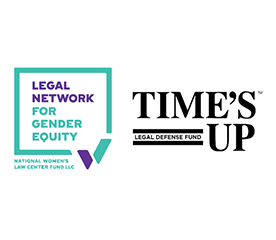Abortion rights, women of color, and LGBTQIA+ people are under attack. Pledge to join us in fighting for gender justice.


All schools that receive money from the federal government must follow Title IX. This includes:

1. Fill out this form. Here is more information about the form and our process. Please note that we will not see your form unless you answer all required questions and click “submit” on the last page.
2. If your situation involves sex discrimination or harassment in education, at we will send you the names of three attorneys in the Legal Network for Gender Equity who work in your state (even if they don’t live in your state).
3. You are responsible for reaching out to the attorneys to set up a call or meeting.
4. Attorneys in our network do a first consultation for free with anyone coming through our network. At that consultation you can talk about what happened to you and discuss your options.
5. After the free first call or meeting, you may want to hire the attorney. Some of the attorneys may offer free or low-cost services. Note that the Legal Network for Gender Equity will have provided you with the names and contact information of attorneys in the Legal Network for informational purposes only. By providing contact information of attorneys, the Legal Network, the TIME’S UP Legal Defense Fund, and NWLC are not endorsing, approving, vouching for, or recommending these attorneys or their firms.
6. You can look here for additional resources.
7. If you need help filling out the form or have questions, please contact us at [email protected] or call us at (202) 319-3053.
8. The Legal Network for Gender Equity (Legal Network) is housed and administered by the National Women’s Law Center Fund, LLC , an affiliate of the National Women’s Law Center (NWLC). NWLC is a legal advocacy organization that fights for gender justice – in the courts, in public policy, and in our society – working across the issues that are central to the lives of women and girls. Your request for legal help will be reviewed by NWLC staff. In some instances, NWLC staff may contact you about your situation to discuss engaging with NWLC in advocacy or litigation. However, NWLC typically only takes on a few matters each year. If NWLC is unable to take your case, as will be the norm, NWLC still may be able to connect you to private attorneys through the Legal Network. Please note that contacting us to request legal assistance does not create an attorney-client relationship with NWLC or with any attorney in the Legal Network.
School complaint: You may want to file a complaint at school against the person who mistreated you. Check your school’s policies to see if there is a deadline for filing a complaint.
OCR complaint: You may want to file a complaint against your school with the U.S. Department of Education’s Office for Civil Rights (OCR). An OCR complaint must be filed within 180 days of the date of the discrimination.
Lawsuit: You want to file a lawsuit against your school. In general, the deadline for filing a Title IX lawsuit ranges from 1 to 6 years, depending on your state. Some states have a longer deadline for sexual assault or for other legal claims. An attorney can help you determine whether you have a Title IX claim or another legal claims against your school and the deadlines.
The Legal Network for Gender Equity and the TIME’S UP Legal Defense Fund are housed at and administered by the National Women’s Law Center Fund, LLC.
The Legal Network for Gender Equity provides the names of attorneys for informational purposes only. By providing contact information of attorneys, the Legal Network for Gender Equity, the TIME’S UP Legal Defense Fund, and NWLC are not endorsing, approving, vouching for, or recommending the attorneys or groups listed. Providing information to NWLC or NWLCF will not create an attorney-client relationship unless NWLC/NWLCF expressly agrees to represent you.
The Legal Network for Gender Equity provides the names of attorneys for informational purposes only. By providing contact information of attorneys, the Legal Network for Gender Equity is not endorsing, approving, vouching for, or recommending the attorneys or groups listed. We cannot guarantee that any of the attorneys will agree to represent you or that if they do, you will have a positive result in your case. And it is important to note that just because an attorney was successful in other cases does not guarantee the same outcome for your case.
Please note that many legal matters have deadlines that you are responsible for meeting. You should speak with an attorney to get advice on your specific situation.
You should assume that we will not offer you legal advice or representation unless you hear otherwise from us. NWLC will not create an attorney-client relationship with you unless NWLC agrees in writing to represent you.
We will keep the information you provide in the form confidential to the extent allowed by law.
Please use the form to request assistance. Please do not come to our office to request assistance; we do not conduct in-person interviews.
If you have questions, please email us at [email protected] or call (202) 319-3053.